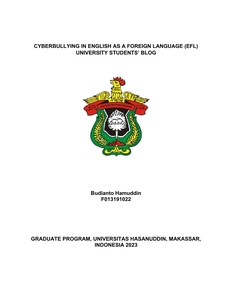Hamuddin, Budianto (2023) Perundungan Siber di Blog Pembelajar Bahasa Inggris sebagai Bahasa Asing (EFL) di Tingkat Universitas = CYBERBULLYING IN ENGLISH AS A FOREIGN LANGUAGE (EFL) UNIVERSITY STUDENTS’ BLOG. Disertasi thesis, Universitas Hasanuddin.
![[thumbnail of Cover]](/35056/1.hassmallThumbnailVersion/F013191022_disertasi_21-02-2024%20Cover1.jpg)

F013191022_disertasi_21-02-2024 Cover1.jpg
Download (241kB) | Preview
F013191022_disertasi_21-02-2024 Bab 1 - Bab 2.pdf
Download (753kB)
F013191022_disertasi_21-02-2024 Dapus.pdf
Download (457kB)
F013191022_disertasi_21-02-2024.pdf
Restricted to Repository staff only until 3 July 2026.
Download (7MB)
Abstract (Abstrak)
BUDIANTO HAMUDDIN. Cyberbullying in English as a Foreign Language (EFL) University Students’ Blog (Supervised by: Fathu Rahman, Abidin Pammu, Yusring Sanusi Baso).
This research examines cyberbullying among English as a Foreign Language (EFL) students who use blogs for learning, with a focus on identifying the types, styles, and motives behind cyberbullying actions on blogs, and proposing systematic steps for an anti-cyberbullying campaign. Through purposive sampling, this study involved 251 bloggers from the English Language Department at Lancang Kuning University. The research applied a mixed-method approach, using online questionnaires, documentation of blog comments, in-depth interviews, and literature review, employing content analysis supported by web applications such as Publish or Perish (PoP) and NVivo 12 qualitative data analysis software on 933 cyberbullying research articles from time to time. The study analyzed 755 cyberbullying comments found during online learning activities in 251 EFL student blogs. Twelve types of cyberbullying actions were successfully identified, including denigration, insult, taunting, and bashing being the most dominant type. A new type of cyberbullying called "praise-drop" was also identified. Further analysis on 921 comments revealed a common practice of combining text with non-text elements such as emojis and emoticons in cyberbullying messages on the blogs. The analysis further uncovered 23 general motives for cyberbullying, with 9 of them found in the interactions on student blogs. In the end, this research proposed an alternative anti-cyberbullying framework that integrates recommendations from previous studies and findings from this research. The anticyberbullying framework emphasizes promotive, preventive, palliative, and rehabilitative strategies that can be tailored to specific cases and evolving online cultures. By addressing cyberbullying within the context of language learning, this research implies broader implications for creating a safer and more inclusive online environment digital interaction worldwide.
Keywords : Cyberbullying trends; Social networking sites (sns); E-learning; Typographic emoticons; Language learners; Anti-cyberbullying.
| Item Type: | Thesis (Disertasi) |
|---|---|
| Uncontrolled Keywords: | Tren perundungan siber; Situs jejaring sosial (SJS); E-pembelajaran; Emotikon Tipografi, Pembelajar bahasa; Anti-perundungan siber |
| Subjects: | P Language and Literature > P Philology. Linguistics |
| Divisions (Program Studi): | Fakultas Ilmu Budaya > Ilmu Linguistik |
| Depositing User: | S.Sos Rasman - |
| Date Deposited: | 03 Jul 2024 06:57 |
| Last Modified: | 03 Jul 2024 06:57 |
| URI: | http://repository.unhas.ac.id:443/id/eprint/35056 |


